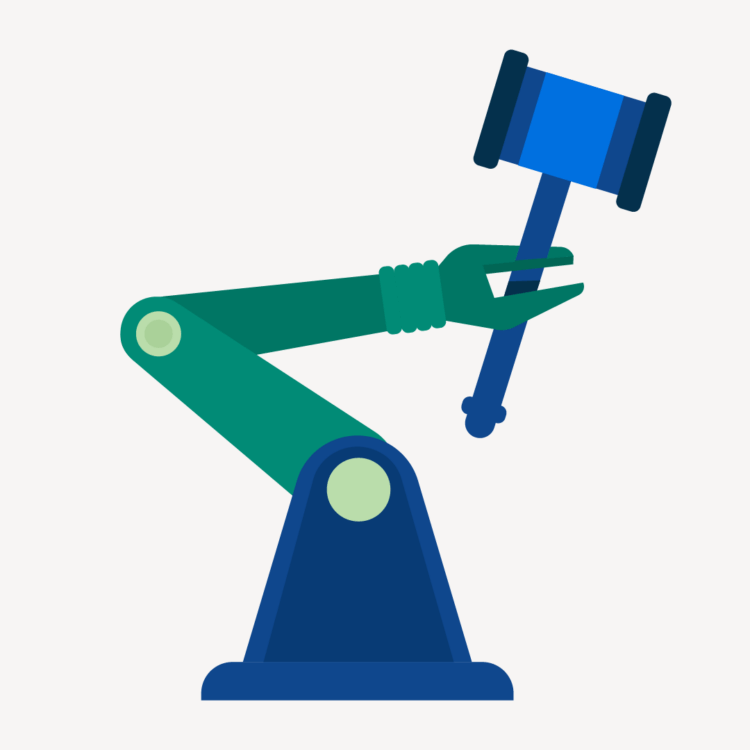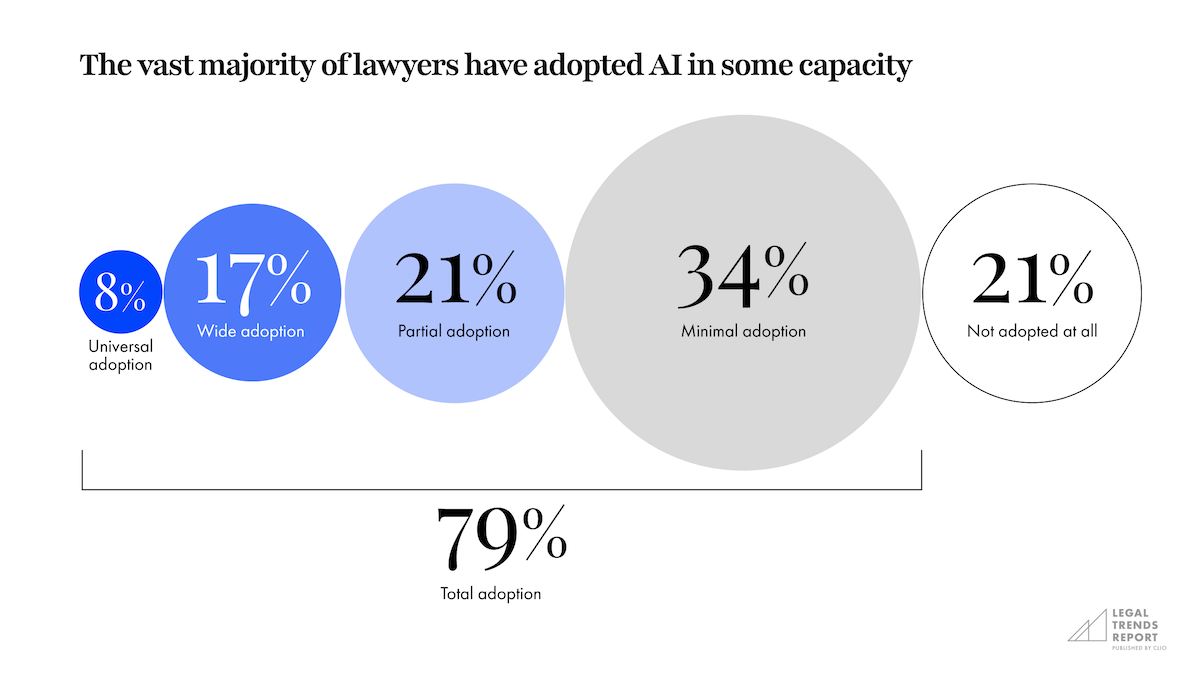Artificial Intelligence (AI) is reshaping how all industries work—even with an Executive Order coming into effect—and completely transforming for legal professionals work.
In fact, according to our latest Legal Trends Report, 79% of legal professionals have adopted AI in some way, and one in four use it widely or universally in their law firms. That same report found that legal professionals believe that AI will save them time and money while increasing their quality of work and productivity.
So, how can AI help legal professionals? In this blog post, we’ll explore:
- What AI is and how law firms can use it responsibly
- Top focus areas for AI implementation in law firms
- How AI benefits both law firms and clients
Learn how to enhance your legal practice with Clio Duo, Clio’s secure, AI-powered solution that helps increase productivity and efficiency, transforming the way legal professionals work.
What is artificial intelligence?
AI is the simulation of human intelligence by machines to perform tasks typically done by people. AI as a field has been around since the 1950s, but has evolved over decades of technological advancements.
AI systems leverage intelligent algorithms that classify, analyze, and make predictions from large amounts of data. These algorithms are trained using large datasets (i.e. “training data”) so that they can identify patterns in data, make predictions, and recommend actions.
We see AI in a variety of ways, like customer support chatbots, speech recognition, self-driving cars, and in automation tools like ChatGPT.
Machine learning vs. natural language processing vs. generative AI
You may have also heard phrases like “machine learning” and “natural language processing” used as part of the conversation surrounding AI in law. While these terms are often used interchangeably, machine learning, natural language processing, and generative AI are subsets of the broader field of AI.
Here’s a quick breakdown of what each of these mean:
- Machine learning refers to humans training machines to learn based on data input. Machine learning looks for patterns in data to draw conclusions and can apply those conclusions to new data.
- Natural language processing (NLP) enables computers to analyze large volumes of text data to identify patterns and relationships and then determine which parts of human language are important. This type of AI in law can be applied to help complete tasks like legal document analysis, e-discovery, contract review, and legal research.
- Generative AI can create new content, such as text, images, music, or code, based on patterns it has learned from existing data. Using models like GPT (Generative Pre-trained Transformer), it generates human-like responses, drafts documents, writes stories, or even creates art by analyzing input data and generating new outputs that mimic human creativity.
AI and the legal industry
Despite the legal industry’s long-standing hesitancy to adopt new technology, AI is also beginning to make its mark on law firms and legal innovation. AI in law firms can deliver significant efficiency and cost-saving benefits for your practice, helping automate routine tasks such as legal research and analysis, document management, and billing.
Let’s explore how lawyer AI can help your firm thrive.
5 Ways to use AI in law firms
The legal industry currently uses AI in many aspects of its work. AI in law firms may not be explicitly noticeable—but it helps lawyers and paralegals do their jobs better.
Specifically, AI in law firms helps legal professionals transform their practice by putting clients first in an unprecedented way.
Below are just a few of the ways lawyers can take advantage of AI in their firms. Be sure to check out our full AI for lawyers hub for even more resources.
How is generative AI used in law firms?
Generative AI is transforming law firms by automating legal document drafting, enhancing research, and streamlining contract review. It speeds up case analysis, improves client communication through AI-powered chatbots, and aids in predictive analytics for better litigation strategies. By summarizing large documents and providing insights, AI helps lawyers focus on high-value tasks, boosting efficiency and service quality.
1. E-Discovery
The simplest and most common form of AI in law is e-discovery: the process of scanning electronic information to obtain non-privileged information relevant to a case or claim.
E-discovery software allows lawyers to scan documents using search terms or specific parameters, such as dates or geographic location.
As a result, lawyers get almost instant responses—which is significantly faster than scanning hard copies. This extra time allows lawyers to discover more relevant information.
2. Legal research
While it can’t do the legal research for you, similar to e-discovery software, AI for lawyers makes the process faster and more efficient.
AI-powered legal research software allows legal professionals to quickly scan and search large databases, including:
- Regulations
- Statutes
- Practice areas
- Jurisdictions
- Case laws, and more.
With legal research software, lawyers can gather data and help them understand precedents.
Conducting more comprehensive research at faster speeds saves lawyers time, which ultimately saves clients money. Tools that integrate with practice management software—such as Casetext and Fastcase—enable users to conduct and attach research directly to relevant case details, allowing for even greater efficiency.
Learn more about how to conduct great legal research.
Top AI tools for legal research include LexisNexis 'Lexis Answers', Westlaw Edge's 'Westlaw AI', Casetext's AI-driven 'CoCounsel', ROSS Intelligence, and JuryOS. These platforms use AI to streamline case research, provide predictive analysis, and assist in document review, making legal work faster and more accurate.
Which AI is best for legal research?
3. Document management and automation
While law firms continue to move away from paper documents, electronic document storage has similar challenges hard copy document storage. Electronic records take less physical space, but sorting and finding documents is still challenging.
Using tagging and profiling functionality, AI-driven document management software stores and organizes legal files, including contracts, case files, notes, and emails. This method of storing and organizing digital files, along with full-text search, makes documents a lot easier to find.
Document management solutions also enable document ID and check-in/check-out privileges to maintain version control and security. Also, document management software can connect to other systems like Microsoft Office to easily share files with others.
Document automation helps law firms create documents using intelligent templates; legal professionals can automatically fill form fields directly from case records into the templates, saving time and effort. Legal document automation provides a centralized and efficient process for producing letters, agreements, motions, pleading, bills, invoices, and other legal documents.
4. Due diligence
Conducting due diligence often requires legal professionals to review a large number of documents, such as contracts. As with other document-related challenges, AI can help legal professionals review documents more quickly.
An AI-based due diligence solution can pull specific documents required for due diligence, like documents containing a specific clause. AI due diligence software can also spot variations or changes in documents.
The best part? AI can go through documents in seconds. While we recommend still having a human review the data, lawyers can benefit from drastically reducing the manual effort of document review.
5. Litigation analysis
Determining the viability of litigation or quantifying the value of a lawsuit requires extensive analysis of precedent-setting cases. Lawyer AI can quickly review those precedents and help lawyers draft more accurate and appropriate documents based on that data.
The best AI tools for law firms are those that readily integrate with your case management software. Clio Duo seamlessly embeds within Clio Manage, allowing users to access AI capabilities directly alongside their existing case and client data. This integration ensures a cohesive experience without needing to switch between platforms.
Top focus areas for AI implementation at law firms
According to a recent Bloomberg Law survey, many law firms have established AI teams or practice groups dedicated to understanding AI—and the top focus areas for these AI practice groups include:
- Privacy and data security – 69%
- Business and tort litigation – 50%
- Intellectual property (copyright and trademark) – 45%
- Intellectual property (patents) – 35%
- Litigation (other) – 25%
- Mergers and acquisitions – 25%
- ESG – 18%
- Labor and employment – 15%
- Securities and capital markets – 15%
Having a dedicated team at your law firm to keep up with the rapid advancements and innovations of AI will ensure your firm is not left behind and allows you to take advantage of new technology as it becomes available to you—whilst keeping up with when to use AI, and when not to.
What does AI mean for the future of the legal industry?
AI presents an exciting opportunity for legal professionals and the legal industry to streamline workflows by automating time-consuming, repetitive tasks. By freeing up valuable hours, lawyers can now focus on client needs, faster case resolution, and quicker payments—all of which boost a firm's financial performance while contributing to closing the access to justice gap.
How can lawyer AI benefit the firm and the client?
Overall, AI helps reduce the time spent on manual tasks, freeing up more time to devote to relationship-building and client-focused activities.
Law firms can realize numerous benefits of adopting AI for both clients and the bottom line:
Increase productivity
Using AI in law firms to automate routine manual tasks and brainstorm ideas helps improve efficiency across the practice. AI-driven processes eliminate labor-intensive, time-consuming activities to boost productivity, whether searching for a contract, conducting due diligence, or creating an invoice.
When lawyers become more efficient, they can focus more time on their clients—while increasing the time spent on billable work.
Improve access to justice
Artificial intelligence and machine learning have the potential to reduce barriers to justice—most notably, the high cost of accessing legal help. By saving time on manual and routine legal work, lawyers using AI can reduce estimates and costs for clients.
For example, lawyers can pass those savings on to clients if research that previously took 20 hours now takes two to complete.
In addition, lawyers can spend the time saved doing tedious research on assisting more clients. While the legal industry does not fully realize these benefits from using AI yet, the potential is there.
Provide a better client-centered experience
The benefits of using AI in law firms boils down to one main advantage: giving lawyers and legal professionals more time.
With AI-driven tools creating time and labor efficiencies, lawyers can have more time to spend directly with clients to foster meaningful relationships.
Ideally, lawyers can go beyond just helping clients solve their legal challenges. Lawyers can get to know their clients better and truly understand how and why they need legal assistance with more time at hand.
By becoming a trusted advisor who takes the time to get to know your clients and deliver an efficient and timely service, your reputation will precede you. Increasing clients’ confidence and trust in you will generate more referrals and better online reviews. This approach can ultimately lead to more clients and revenue for your law firm.
Be sure to check out our AI for lawyers hub to explore more topics like:
- Ethical considerations of AI for lawyers
- AI tools for lawyers
- Generative AI and law firms
- ChatGPT for Lawyers
Check out the functionality of Clio Duo and how it can accelerate a lawyer’s workday: Meet Clio Duo: Your Firm’s New AI-Powered Partner
Challenges and Considerations with AI for Lawyers
While there are many benefits of AI for lawyers, it’s not magic—and lawyers have a duty to use it responsibly. When implementing AI, there are some challenges and considerations that law firms should bear in mind.
Ethical considerations with lawyer AI
While AI can unlock efficiencies for lawyers, it also raises questions of ethics that law firms should consider—especially the potential for bias.
Because AI uses data that comes from humans to create outputs and predictions—and humans can be biased—AI comes with an inherent potential for bias.
For example, if past legal decisions are made with unfair bias, and an AI tool uses machine learning based on those decisions to draw conclusions, then the AI could inadvertently learn that same bias. With this in mind, it’s important that lawyers consider potential bias when using AI.
You can learn more about all the ethical considerations lawyers and law firms need to keep in mind in this post and in this blog: AI Legal Issues: Navigating Challenges and Risks in the Era of Artificial Intelligence.
Ensuring data privacy when using lawyer AI
It’s a lawyer’s duty to protect client information and keep confidential data safe, which means that law firms must be diligent about the security of any potential tools they use. And, because most AI tools use data to function, it’s especially important for law firms to be careful about what data they allow AI to access.
For example, you don’t want to add your client’s confidential information to a database that may be accessed and used by AI for someone else.
With this in mind, it’s important for law firms to vet AI vendors carefully, and also to ensure they protect confidential data.
Lawyer AI training and education
Proper training and education are key to helping ensure the responsible and ethical use of AI in law firms. While not every lawyer needs to be an expert on the science of artificial intelligence, having an understanding of how AI tools work is essential to help lawyers use them responsibly and identify any potential ethical or privacy concerns.
By understanding how an AI technology works, when vetting, implementing, and using tools, lawyers can then use their expertise to determine how and when to use them appropriately in their practice.
Final thoughts on AI for lawyers and its potential for law firms
While it is not foolproof and requires law firms to be cautious and considerate of potential ethical and privacy concerns, AI for lawyers has the potential to transform how lawyers work.
When used responsibly, AI tools can be taught to automate and perform certain routine tasks for lawyers like e-discovery, document management, and brainstorming. This helps lawyers get more done with less time and less effort—freeing up time to deliver better client experiences at a lower cost. In this way, using AI tools can also help improve access to justice for more clients.
With Clio Duo, Clio’s AI-powered partner, lawyers can use AI securely and ethically to increase productivity and efficiency. Embedded within Clio’s practice management system, Clio Duo taps into your firm’s specific data, providing relevant, accurate results tailored to your needs. Book a demo today to discover how Clio Duo can accelerate the way you work.
Frequently Asked Questions
Will lawyers get replaced by AI?
No, AI won’t replace lawyers. Instead, AI will be used by lawyers to boost efficiency and productivity by automating and speeding up time-consuming tasks. This results in lawyers having more time to connect with clients and close cases in a shorter time, leading to more profits.
Read more in our blog post: Will AI Replace Lawyers?
Can lawyers use AI?
Yes, with caution. Lawyers are already using AI in much of their legal work, such as reviewing documents during litigation, or helping with legal research. Of course, a compliance-driven profession like law means a cautious approach to AI best.
Legal AI Virtual Summit 2025
Learn how law firms can unlock AI’s potential and work smarter in this free, CLE-Eligible event taking place on Monday, February 10 from 11:15 a.m. – 5:30 p.m. ET.
Register now




